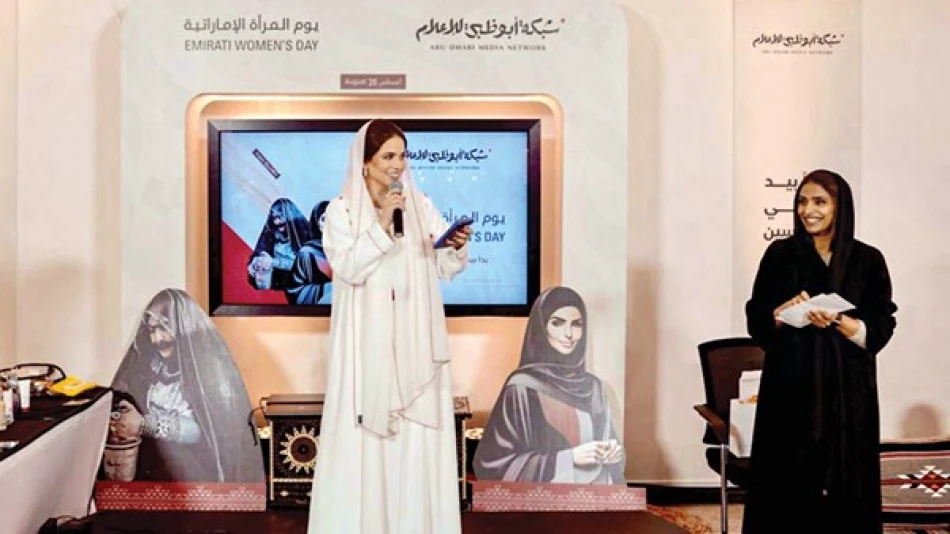
Abu Dhabi Media Celebrates Emirati Women's Remarkable National and Pioneering Achievements
UAE's Leading Media Company Celebrates Women's Empowerment as Nation Marks Historic Gender Equality Milestone
Abu Dhabi Media, the UAE's flagship media corporation, has organized comprehensive celebrations for Emirati Women's Day 2025, highlighting the nation's ambitious push toward gender parity through the newly launched "Mother of the UAE 50:50" vision. The initiative coincides with the 50th anniversary of the General Women's Union and positions 2025 as the UAE's designated "Year of Community," signaling a strategic shift toward deeper social cohesion and women's economic participation.
Strategic Vision Behind the Celebrations
The celebrations, held under the theme "Hand in Hand, We Celebrate the Fifty," were launched under the guidance of Sheikha Fatima bint Mubarak, known as the "Mother of the UAE." As President of the General Women's Union and Supreme Chairwoman of the Family Development Foundation, her leadership reflects the UAE's top-down commitment to gender equality that has become a hallmark of the nation's social policy.
The event at Al Ittihad newspaper headquarters demonstrates how media organizations are being positioned as key drivers of social change, rather than mere observers. This approach mirrors successful gender empowerment campaigns in progressive nations like Iceland and Rwanda, where media played crucial roles in shifting public discourse around women's roles.
Economic Implications of Gender Parity Push
Workforce Transformation
The "50:50" vision represents more than symbolic equality—it signals a fundamental restructuring of the UAE's knowledge economy. With women already comprising over 70% of UAE university graduates, the initiative aims to translate educational achievements into leadership positions across sectors including finance, technology, and energy.
This mirrors Singapore's successful gender integration strategy from the 1990s, which contributed an estimated 2.5% annual GDP boost through expanded female workforce participation in high-value sectors.
Media Industry Leadership
Abu Dhabi Media CEO Rashid Al Qubaisi's emphasis on women as "strategic partners in development" reflects broader regional trends where media companies are becoming vehicles for social transformation. The company's multi-platform approach—spanning television, digital, and print—positions it to influence public perception across generational lines.
Regional Context and Global Positioning
The UAE's approach contrasts sharply with regional neighbors by embedding gender equality within national economic strategy. While Saudi Arabia has made headlines with driving rights and Vision 2030, the UAE's focus on institutional integration and media-driven narrative change represents a more comprehensive approach.
The timing is strategically significant: as the UAE prepares to host COP30 climate talks and positions itself as a global business hub, demonstrating advanced social policies becomes crucial for attracting international talent and investment.
Implementation and Measurable Outcomes
Corporate Integration
Abu Dhabi Media's internal celebrations involving employees across departments signal how the initiative will be measured—through workplace culture transformation rather than just policy announcements. This grassroots approach has proven more sustainable than top-down mandates in similar international cases.
Content Strategy Impact
The company's commitment to producing "meaningful content highlighting Emirati women's achievements" represents a shift from ceremonial coverage to systematic narrative building. This content strategy approach has proven effective in countries like Canada and New Zealand, where media representation directly correlated with increased female leadership in business and politics.
Long-term Strategic Implications
The designation of 2025 as the "Year of Community" alongside the 50:50 vision suggests the UAE is preparing for a more participatory governance model. This evolution from traditional top-down leadership to community-engaged decision-making could position the UAE as a model for other Gulf nations navigating modernization pressures.
For international observers, the UAE's systematic approach to gender integration—combining economic incentives, media influence, and institutional support—offers a replicable framework for nations seeking to accelerate social change without destabilizing traditional structures. The success or failure of this initiative will likely influence policy approaches across the broader Middle East region over the next decade.
Most Viewed News

 Layla Al Mansoori
Layla Al Mansoori






